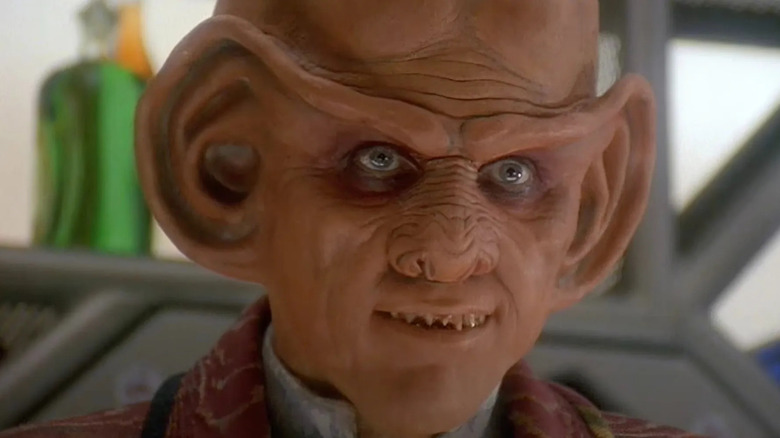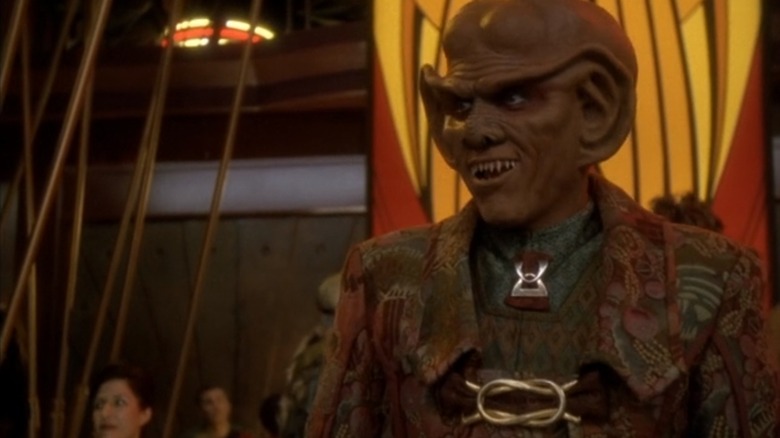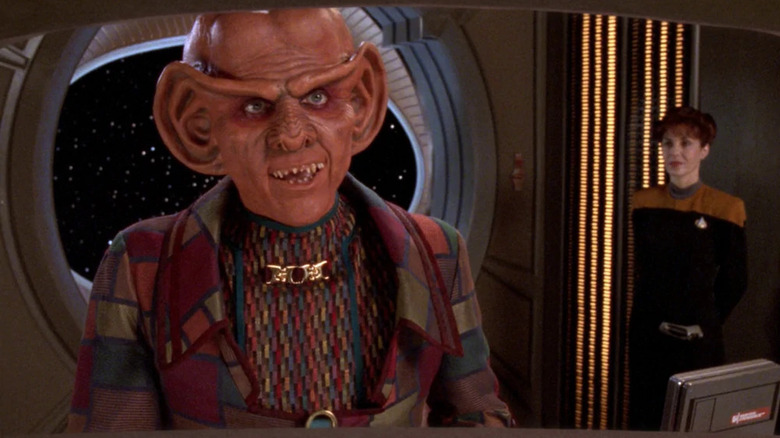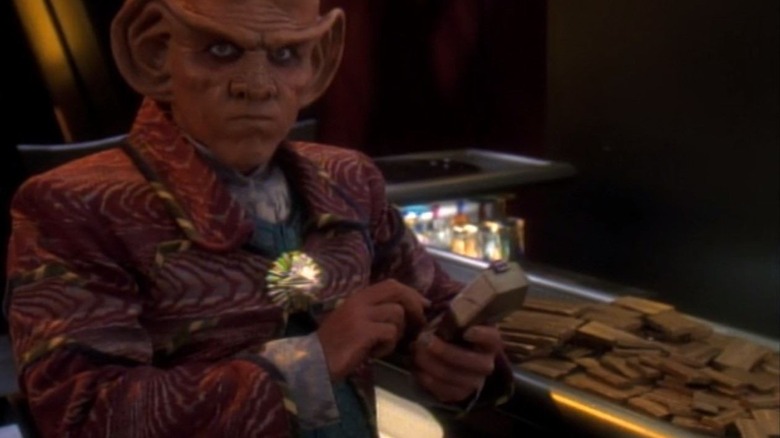Why Deep Space Nine's Quark Is The Greatest Star Trek Character
When it first began airing in 1993, "Star Trek: Deep Space Nine" was instantly considered a notable oddball in the broader "Star Trek" canon. For one, it was the first Trek project that was made completely outside of the auspices of Trek creator Gene Roddenberry. Also, being set on a space station, there was going to be considerably less trekking on "Deep Space Nine" than had been previously seen in the franchise. Additionally, the show was to follow the politics and social intricacies of worlds that did not belong to Trek's famed United Federation of Planets. That meant the franchise's notable and vaunted post-war, post-religion, post-capitalist utopia was going to be challenged by those who believed in war (the Cardassians), in theocracy (the Bajorans), and in capitalism (the Ferengi). "Deep Space Nine" stood as a deliberate challenge to the Treks that preceded it. Can Roddenberry's ideals stand when those who abide by them are outnumbered?
The lessons from "Deep Space Nine" were more forthrightly multicultural than the relatively mannered "Star Trek: The Next Generation." While NextGen was populated by diplomats and open-minded explorers of cultural differences, it was rare that any of them were pushed too far outside of their comfort zones; how strange, Counselor Troi might find, that a new species enjoys chocolate so much. On "Deep Space Nine," the Starfleet characters had to face the notion that people bearing opposite values to their own were going to remain deeply and strictly adherent to them. A soft version of easily-acquired arbitrage would have to be abandoned for the notion of having to live with someone you fundamentally disagree with ... and do not necessarily hate.
No character on DS9 was more deeply principled than Quark (Armin Shimerman), the Ferengi bar owner on the station's high-traffic Promenade.
Quark
For the uninitiated, the Ferengi are a species that has devoted every aspect of their society to commerce. Money is deeply involved in every aspect of their lives. When friends come to visit a Ferengi, they have to drop money into coin boxes in every room in the house. When a Ferengi dies, their ashes are sold inside miniature collectible discs. Even their central religion is based on profit, as a Ferengi will not be able to buy their way into the afterlife unless they have acquired enough wealth in this one. Their most widely read holy book is simply a list of 285 Rules of Acquisition. Needless to say, devotion to wealth also carries with it a tendency toward both labyrinthine accounting and a propensity toward confidence schemes. Cutting corners, buying cheap materials, and underpaying employees is a great virtue in Ferengi society. The most grievous sin is charity.
Additionally, Ferengi society is staggeringly sexist. Only men are allowed to earn wealth, whereas women are not allowed to speak to any men other than their immediate family. They are also not allowed to wear clothing. Over the course of "Deep Space Nine," Ferengi sexism will be challenged time and time again, with Quark having to face the fact that his mother Ishka (Andrea Martin, then Cecily Adams) has been secretly leading the charge toward a women's liberation movement back on their home planet.
Quark, throughout the series, is deeply devoted to these Ferengi principles. They may seem backward and even gross to a human viewer, but Quark never once winks at the camera, nor does Shimerman plays the character as wicked. Devious, perhaps. Criminal, to be sure. But not sadistic or cruel. Indeed, Quark is typically either upbeat (when business is booming) or annoyed (when it isn't).
Criminal, but not evil
Quark is perpetually annoyed, incredibly shrewd, and often called out on his bad behavior. But — and here's what makes his character so appealing — he never abandons the fundamental things that make him who he is. His personal beliefs are dearly held, and he will not — will not — abandon them. In a true science fiction sense, Quark provides an outsider perspective on humanity, looking to their habits of charity and their baffling abandonment of capitalism as strange and offputting.
Something magical happens on "Star Trek" when two nonhuman characters interact. Humans, in subsequent discussions, become ineffable and confusing. Our culture is just as strange to them as theirs is to us. Starfleet may be making a perpetual effort to include and understand others, but Ferengi have no such compunction, choosing to criticize and deconstruct some of our own fineries. In one of the best scenes of the entire series, Quark has a conversation with Garak (Andrew Robinson) a Cardassian tailor who once served the war effort. Neither character has spent much time with humans, and each bemoans the fact that so many of them have just moved onto the station. As an example of how bad humans reflect on his business, Quark serves Garak a glass of root beer. Garak hisses that it's vile. "I know," Quark says, disgusted. "It's so bubbly, and cloying, and happy."
"Just like the Federation," Garak says.
"But you know what's really frightening? If you drink enough of it, you begin to like it," Quark says. "Just like the Federation."
Being bubbly and eager to please, the two aliens note, shows a grievous lack of character. The Federation, Quark says out loud, has a lot to be wary of.
Quark's moment
Quark and the other Ferengi characters on "Deep Space Nine" were often treated like comic relief, and one can bet that a "comedy" episode was likely about Quark and his family (his brother Rom, played by Max Grodénchik, often had "dim bulb" scenes). It took "Deep Space Nine" a while to decide just how intelligent Quark was meant to be (a frustration for Shimerman), often seeing him vacillate between crafty and clueless. It took "Deep Space Nine" several years to allow the Ferengi characters to grow. Rom was revealed to be a decent, kind man with sharp engineering skills, and Rom's son Nog (Aron Eisenberg) wanted to become a Starfleet officer.
Quark, meanwhile, was eventually allowed to be intelligent and deeply righteous. Even honorable. The character's best moment probably came in the penultimate episode of the show, "The Dogs of War" (May 24, 1999) wherein Shimerman gets to express the deep, glorious beliefs of the character. "As far as I'm concerned," he says, "the Ferenginar that I knew doesn't exist anymore." He says "This establishment will be the last outpost of what made Ferenginar great: the unrelenting lust for profit."
What he is standing for might look petty to the human audience, but after seven seasons with Quark, they have most assuredly come to sympathize with him. So when Quark says he won't preside over the demise of Ferengi civilization, we see a man standing up for himself. We see a man eager to keep his ideals. "The line has to be drawn here!" he shouts. "This far and no further!"
Quark is willing to exploit, but he is also willing to play by his own rules. And what is "Star Trek" if not strong-willed adults articulately standing up for what they believe in?



